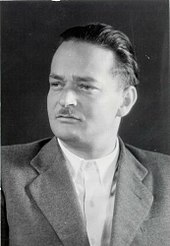Boris Kidrič
Boris Kidrič (born April 10, 1912 in Vienna , † April 11, 1953 in Ljubljana ) was a Yugoslav communist partisan and politician.
Political career
Boris Kidrič was born in Vienna as the son of the liberal Slovenian intellectual and literary critic France Kidrič (1880–1950). In the early 1930s, under the influence of Vlado Kozak , he joined the Communist Party of Yugoslavia . Kidrič quickly rose to high party offices in the Yugoslav region of Dravska banovina , which encompassed large parts of present-day Slovenia . In 1937 Kidrič was one of the founders of the Communist Party of Slovenia .
After the invasion of Yugoslavia by the Axis Powers on April 6, 1941, Kidrič became the de facto leader of the Slovenian Liberation Front founded on April 26, 1941 in Ljubljana ( Slovene : Osvobodilna Fronta - OF), which offered tough military resistance against the occupying powers. Together with Edvard Kardelj (1910–1979) he organized the partisan war in Northern Yugoslavia between 1941 and 1945 .
After the end of the Second World War , the Slovenian People's Liberation Council ( Slovenski Narodnoosvobodilni Svet ) appointed Kidrič in May 1945 as the first Prime Minister of the Socialist Republic of Slovenia , a republic of the Federal People's Republic of Yugoslavia . He held the office from May 5, 1945 to June 1, 1946.
After the Second World War, Kidrič played a major role in the expropriation and expulsion of the German-speaking minority ( Gottscheer and Untersteirer) from the northern parts of Yugoslavia, which he called for in a public speech in Maribor in June 1945 "without any sentimentality". The municipality of Strnišče (Sterntal), in which the central camp for the expulsion of Slovenian Germans, the Sterntal camp, was located, was later named Kidričevo after him.
From 1946 until his death Kidrič was responsible for building the socialist Yugoslav economic order . From 1948 he was a member of the Politburo of the Communist Party of Yugoslavia.
In December 1949 Kidrič became a full member of the Slovenian Academy of Sciences and Arts . He was the recipient of numerous high honors, including the Order of National Hero of Yugoslavia ( Serbo-Croatian Орден народног хероја Југославије) and the Soviet Order of Kutuzov .
In 1953 Boris Kidrič died of leukemia in Ljubljana . In 1959 a larger than life monument was erected in the immediate vicinity of the Slovenian government building. In 1963 a monument to Boris Kidrič was inaugurated on the square named after him in Maribor . It was made by the Slovenian artist Stojan Batiča . Because of Kidrič's possible involvement in revenge actions by the partisans after the Second World War (kidnappings, arbitrary arrests and shooting of real or alleged opponents), his monuments are controversial in Slovenia today.
A wagon construction factory in Maribor was named after him. a. made the special train of Tito .
Private life
Boris Kidrič was married to the Yugoslav communist Zdenka Kidrič , née Armič, (* 1909, † 2008).
literature
- Janko Prunk : Kidrič, Boris - Peter. In: Enciklopedija Slovenije . Ljubljana 1987-2002 Volume 5, pp. 62-63
Web links
Remarks
- ↑ from 1952 Union of Communists of Yugoslavia
Individual evidence
- ↑ a b Inquiry from MP Kurzmann and other MPs to the Federal Ministry for European and International Affairs regarding the kidnapping of Austrian citizens in southern Styria and south-eastern Carinthia by Tito Partisans. , on parlament.gv.at
- ^ The AVNOJ-Regulations and the Genocide of the Germans in Yugoslavia between 1944-1948. Retrieved February 7, 2020 .
- ↑ SLOVENE HISTORY - 20TH CENTURY ( Memento from August 4, 2012 on WebCite )
| personal data | |
|---|---|
| SURNAME | Kidrič, Boris |
| BRIEF DESCRIPTION | Yugoslav politician |
| DATE OF BIRTH | April 10, 1912 |
| PLACE OF BIRTH | Vienna |
| DATE OF DEATH | April 11, 1953 |
| Place of death | Ljubljana |
